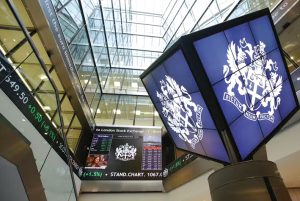Rishi Sunak might be a safe pair of hands for the UK economy, but investors don’t expect his premiership to give a significant boost to country’s beaten-down equities.
While the ex-Goldman Sachs banker is set to bring an end to the kind of extreme volatility that characterised Liz Truss’s brief tenure in Downing Street, Sunak’s more prudent fiscal approach is unlikely to offer much immediate relief to domestically-focused stocks.
Business confidence in Britain has “collapsed to an exceptionally low level,†according to Davy economist Conall MacCoille. He cited the purchasing managers index plunge, which showed a steep fall in orders, blamed on inflationary pressures, rising interest rates and “the toll of the fall-out from the mini-budget.â€
The FTSE 250 Index of midcap stocks is little changed since Truss resigned last week, missing out on a broader rally across European markets.
While Sunak’s policies may make sense for the nation, “for the market it means it might be slower to get back to growth,†says Tineke Frikkee, head of UK equity research at Waverton Investment Management. Frikkee notes that it was during Sunak’s time as Chancellor of the Exchequer that Britain announced a windfall tax on oil and gas companies, though she says he appears conscious of not deterring investment.
And Thomas Pugh, an economist at audit, tax and consulting firm RSM UK, warns that Sunak’s focus on fiscal discipline brings the prospect of a deeper recession but lower interest rates.
For some, such as JPMorgan economist Allan Monks, much rests upon who Sunak chooses as his Chancellor. “The implications for growth will depend more on whether the current Chancellor remains,†Monks says in reference to Jeremy Hunt, whom Truss appointed to the role only last week and who ditched most of her unfunded tax cuts. Sunak is expected to keep Hunt in the role, according to reports.
Hunt is due to provide an updated economic plan on October 31, alongside keenly-awaited projections from the Office for Budget Responsibility. However, a report in The Times newspaper said the speech could be delayed, a development that might spook investors.
Jefferies says it now favours the FTSE 250 over the FTSE 100. A rally for gilts and narrowing of credit spreads as Sunak clinched the premiership has moved the broker’s financial conditions index “away from the abyss,†strategist Sean Darby wrote in a note.
—Bloomberg
 The Gulf Time Newspaper One of the finest business newspapers in the UAE brought to you by our professional writers and editors.
The Gulf Time Newspaper One of the finest business newspapers in the UAE brought to you by our professional writers and editors.
